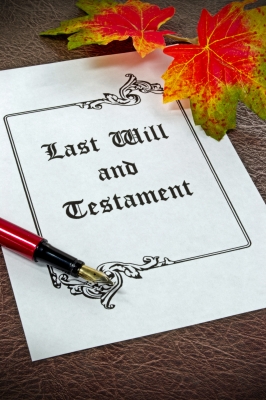According to Noreen Perrotta, editor of Consumer Reports Money Advisor, “Nearly 60 percent of all Americans do not have a Will or estate plan. Why? Because they think they don’t need it.”
At least most people have heard of a Will and have an opinion about whether they need one or not; however, how many people are familiar with a Financial Durable Power of Attorney, a Living Will, a Medical Power of Attorney, a HIPAA Release or a DNR (do not resuscitate)? I am not a lawyer, so this article is not to be considered legal advice. The purpose is to educate you about the various legal documents you should have in place at any age, but especially as you grow older and the need for these documents increases.
Did you know that if you do not have a Will the state in which you reside has one for you and will determine how your estate will be divided? A Will is simply a document in which you tell everyone how you want your estate to be left and divided among your family, friends or charities. You will name an executor who may be a friend, family member or attorney. Their job is to carry out your wishes as stated in your Will. A Will is the only way you can be certain your wishes will be carried out after your death.
A Financial Durable Power of Attorney is necessary when you want to make someone legally allowable to make financial decisions for you. They will have this right until it is revoked. A person with Financial Durable Power of Attorney can make any and all financial decisions for you unless limited by the document. You can give as much or as little authority as you want from only paying your bills to buying and selling property and real estate. They can also apply on your behalf for Medicare, Medicaid, Social Security or other government programs. You only give the power you want to give but if you are unable to conduct your own business, you need to have someone who can legally do that for you. You can also put in writing when you want this document to become effective. It can become effective when you sign it or upon your disability or incapacity. You can define the disability or incapacity or you can default to letting a physician make the determination of your capacity to handle your own financial affairs.
A Living Will, Healthcare Directive and Advance Directive are all terms that refer to the legal document that describes your wishes regarding life-prolonging medical treatments. You should have a living will because it tells your family and healthcare provider what your wishes are for your medical treatment if you become incapacitated or are not able to speak for yourself. A Living Will usually requires certification by a physician that you are suffering from a terminal illness or are permanently unconscious before it becomes effective. A Living Will is used only when recovery is hopeless.
A Medical Power of Attorney is necessary if your health is not so dire that your Living Will is activated but you may still be incapacitated or unable to make decisions. In this case, the person you authorize to make decisions for you in the Medical Power of Attorney has that authority. That person should consider what you want; therefore it is crucial that you let them know your wishes. This can be a difficult conversation but it will ease the burden of that person if they know what your wishes are. They are speaking for you!
The Health Insurance Portability and Accountability Act (HIPAA) limits disclosure of your protected medical information. This release lets you list the people with whom you want medical personnel to be able to discuss your medical condition. It allows for family members or friends whom you trust to discuss your medical condition in conjunction with medical personnel to help you make the best decision for you. Without this release, sharing of information can be limited. It also may be a violation of the HIPAA law for which medical personnel can be fined or prosecuted. This release is only necessary for medical personnel. Once your family or friends have your medical information they can share it with anyone with no limitations.
A DNR (do not resuscitate) document indicates your desire to withhold life saving measures in the event of a natural death. The DNR may be put in place by you or your Medical Power of Attorney, or two physicians acting on your behalf if you are incompetent or unable to make your wishes known and do not have a Medical Power of Attorney. The DNR must have two witnesses, except when the physicians execute it. Your DNR may be revoked at any time by the person or persons who executed the DNR. The DNR is automatically revoked in the case of unnatural or suspicious circumstances.
So, there is the list of legal documents you need to have in place. If you already have them in place, it is a good idea to review them and make sure they still reflect your wishes. If you do not have them in place, get to work so your wishes are known and can be followed!
Article by Rodney Rueter, CEO/president of Lutheran Sunset Ministries.
